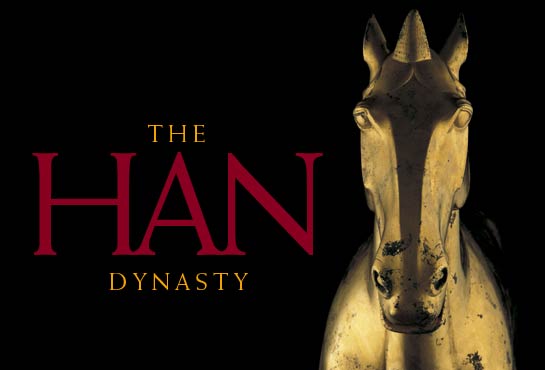
The conquests in Central Asia of the Han emperor Wu Di and his embassies to the west opened up a major trade route linking East and West. Merchant caravans took Chinese goods (especially silk) as far as the Roman Empire in exchange for Western luxury goods. Well-preserved documents from northwestern China and along this “Silk Road” record the everyday life in garrison towns.
The reign of Han Wudi (141-87 BCE) represented not only the triumph of imperial centralism but also the high point of Han expansionism.
On February 28, 202 b.c.e., over three hundred nobles and generals gathered on the north bank of the Fan River to proclaim Liu Bang (pronounced Leo Bahng) the first emperor of the Han (Hahn) dynasty. They had little idea of what the future might bring, but they certainly hoped that a new dynasty would mean the end of war. For five years China had been torn apart by civil war between the forces of Liu Bang and Xiang Yu (Shee-ong You). This struggle had followed the collapse of the repressive Qin (Cheen) dynasty, which itself had only offered fourteen years of respite from five centuries of nearly constant warfare. Tens of thousands of men had died in battle, traditional Chinese culture had been turned upside down, and the people were exhausted. Perhaps stability had finally come.
In fact, the Han dynasty would last for over four hundred years, easily rivaling its contemporary on the other side of Eurasia—the Roman Empire—in terms of territory, military might, cultural sophistication, and population (both had about 60 million people). (See the volumes in the Greenwood Guides to Historic Events on the rise of the Roman Empire and the decline and fall of the Roman Empire.) Equally important, the methods of government developed at that time would serve as the basis for Imperial China—the sequence of dynasties that would carry China into the twentieth century, when the last emperor of China lost his throne in 1911 c.e. Although there were many changes over the two thousand years of Imperial China, there were remarkable continuities as well, and Chinese civilization ranks as one of the most successful social systems in human history.
As Liu Bang took the title of emperor on that chilly February day, everyone in attendance must have thought about the history of that office, and what accepting it might mean. The Chinese had long believed in an impersonal, moral force they called Heaven. With the approval, or mandate, of Heaven, a king could gain power and rule, but when his descendants became corrupt and oblivious to the suffering of the common people, Heaven would withdraw its mandate and bestow it upon another family who were thereby authorized to lead a revolt. The last time Heaven had unambiguously chosen a ruler was nearly eight hundred years earlier, with the founding of the Zhou (Joe) dynasty. But the last ruler of that line had been overthrown some fifty-four years earlier in 256, and there had been chaos ever since. The First Emperor of the Qin dynasty had unified China in 221, but he had done so through sheer military force and had not justified his actions by claiming the Mandate. In fact, his scholars had advocated an entirely different model of political change based on Five Phases—Earth, Wood, Metal, Fire, and Water—that naturally overcame one another in turn. He claimed that his armies had conquered the Zhou dynasty, associated with Fire, by the awesome power of Water, and he invented the new title of “Emperor” to reflect his unprecedented power as the solitary ruler sitting at the apex of a centralized, bureaucratic empire. But his presumption now looked laughable in light of his short-lived reign.
Could Liu Bang, who had begun his life as a peasant, be the next recipient of Heaven’s mandate? Would he too rule by the power of Water or would he adopt his own patron phase? Could he even claim the title of “Emperor”? Within weeks of the death of his rival Xiang Yu, Liu’s advisors were urging him to make himself an emperor. In good Chinese fashion, he refused three times, saying, “I have heard that the title of emperor can only be held by those who are worthy. It is not something that can be maintained by empty words and vain speeches. I dare not accept the position of emperor.” In the end, however, he sat on the throne (as he had wanted all along) with the excuse that he was doing so “for the good of the country.”
Liu’s first act as emperor was to appoint seven of his followers as deputy kings (this formal recognition of their local authority was probably one reason they encouraged him to become emperor), and then, as the great historian Sima Qian (Sue-ma Chyen) noted in a particularly resonant phrase, “All under Heaven was at peace.” But this was not the end of the story; indeed, it was not really the beginning either. The Han represented a continuation of many earlier practices—especially those of the Qin dynasty, which it simultaneously imitated and reviled—and there were also innovations over the next century that made the Han dynasty the model of imperial rule throughout Chinese history.